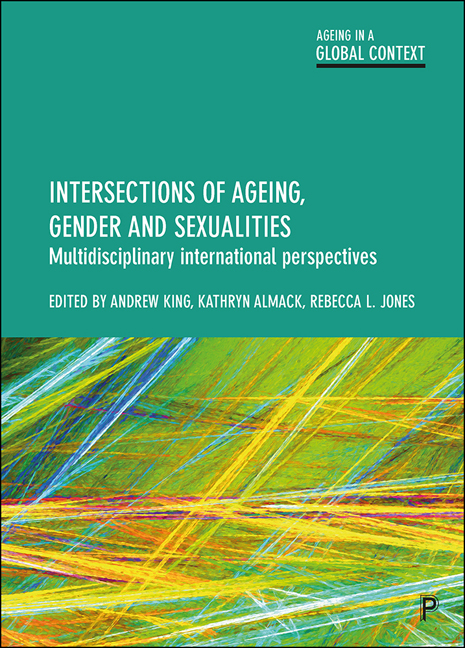three - The queer subject of ‘getting on’
Published online by Cambridge University Press: 27 April 2022
Summary
Introduction
This chapter aims to address the theme of intersections of ageing, gender and sexualities as matched to – or far from – the particular research projects which I have undertaken, often involving intersections of class, gender and sexuality. In considering what to present at the related conference and write-up in this chapter, I wanted to question (myself), and had to resist (my own), urges to pull data from particular aged research participants, as older or, indeed, younger; certainly I could have done this as my research has usually involved participants across diverse age ranges. In my current project, Making Space for Queer Identifying Religious Youth, I am seeing how young people inhabit particular times, places, bodies as aged subjects with certain rememberings of the past and projections for the future (Taylor and Snowdon, 2014a, b; Taylor, 2015). To think of these intersections involves a consideration of the ‘queer subject’ of ‘getting on’ in the context of international equalities legislating supposedly making new ‘sexual citizens’.
In this chapter I want to explore three cases: ‘queer families’, ‘queer cares’ and the queer spaces of academia, to inflect ideas of ‘moving on’ and becoming as interrupted and interrupting of linear trajectories of, for example, becoming sexual citizenship, becoming adult and becoming academic. I interweave these examples to explore interruptions to normative career-caring trajectories by highlighting work–life balances and the effort of ‘getting on’ as applied in research– researched–researcher exchanges, experiences and biographies.
To think of ‘age’ is perhaps often to think of the embodied subject who has aged. On a more collective level, sexualities research is replete with metaphors of ‘coming of age’, of maturing into disciplines, of appearing in social policies and claiming full-citizenship rights and entitlements, arguably grappling with a new ‘world we’ve won’ as sexual citizens (Weeks, 2007). This becoming ‘someone’ as a self-actualised and entitled subject is apparent within celebrations of the ‘world we’ve won’ as lesbian, gay, bisexual, transgender (LGBT) groups and individuals realise sexual citizenship in the realms of family and working lives (Weeks, 2007; McDermott, 2011). In ‘arriving’ in places of sexual citizenship, young people are often seen as the beneficiaries of previous generations’ struggles but they are often simultaneously ‘invisiblised’ because they are ‘not yet’ fully in the worlds of family and employment (Taylor et al., 2010; Taylor, 2017).
- Type
- Chapter
- Information
- Intersections of Ageing, Gender and SexualitiesMultidisciplinary International Perspectives, pp. 31 - 46Publisher: Bristol University PressPrint publication year: 2019

